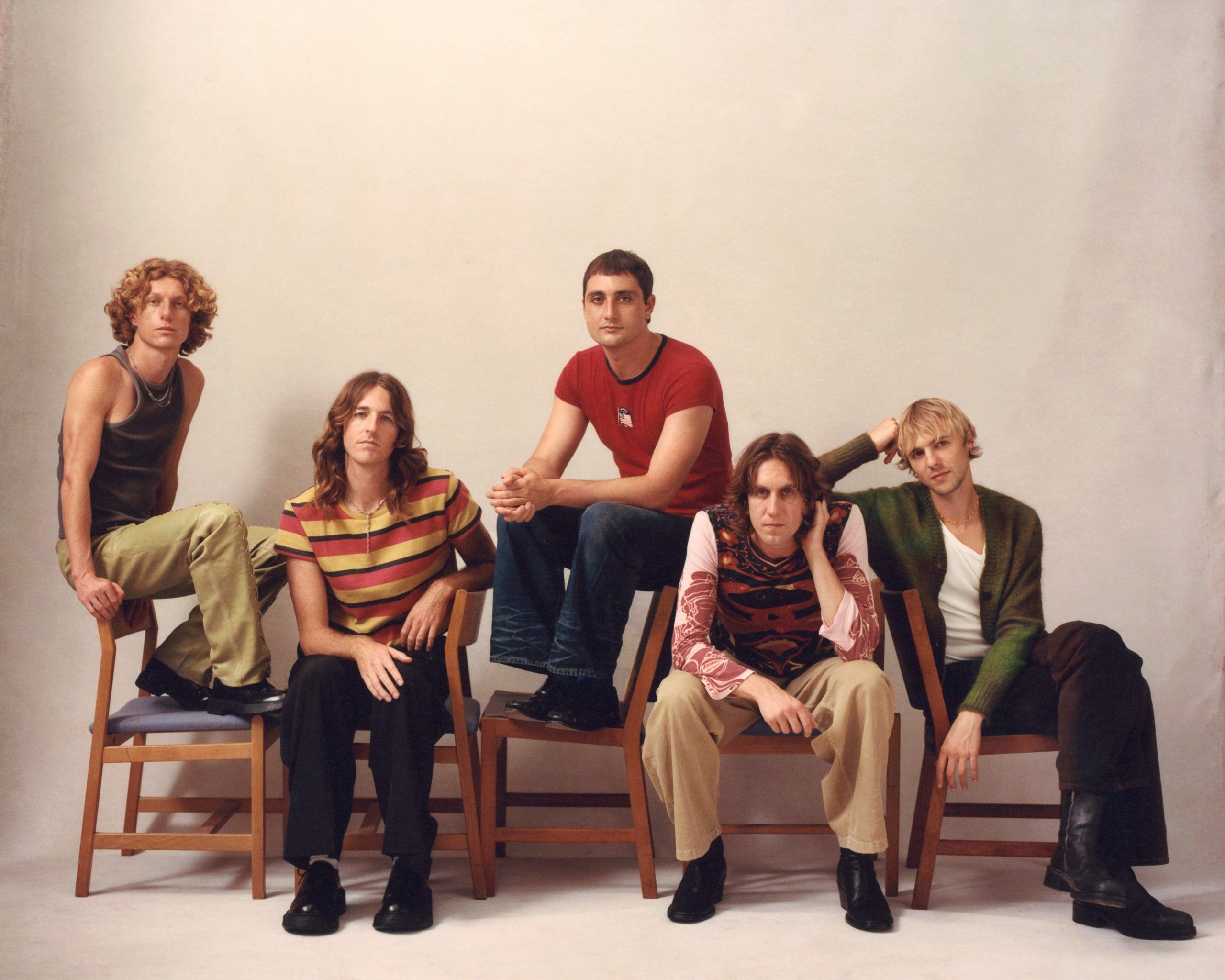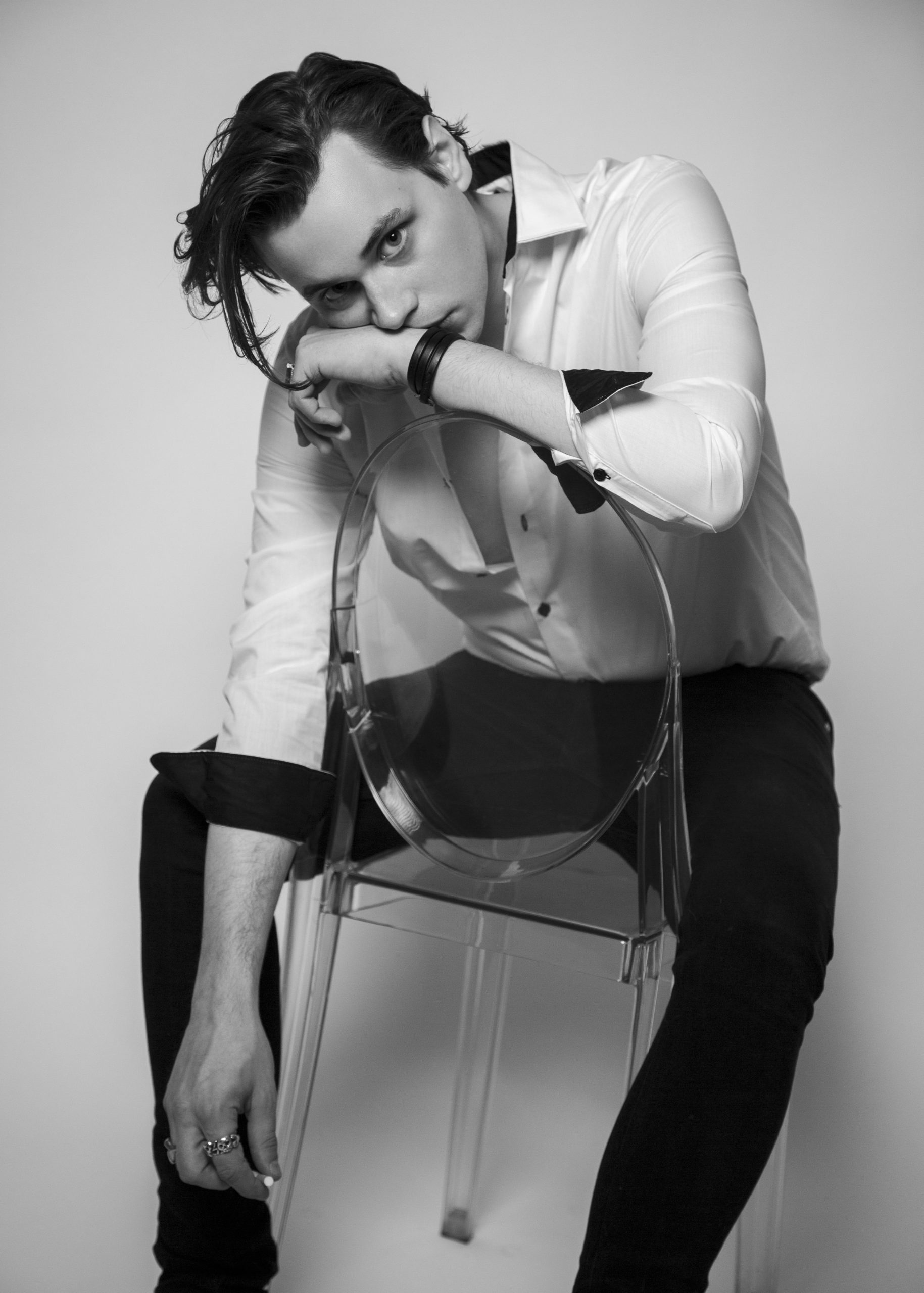Few bands craft as distinctly euphoric and dance-worthy tracks as Australian quintet, Parcels.
Since the band’s formation as teenagers in Byron Bay back in 2014, Louie Swain, Patrick Hetherington, Noah Hill, Anatole Serret, and Jules Crommelin have proved to be indie-pop mainstays. They pen songs with a real sense of happiness and optimism — 1970s-inspired sonics that traverse indie, dance, soul, electropop, and pure disco. Over the last 11 years, the band has been on a remarkable journey that many artists could only dream of.
In 2016, the Berlin-based group played their first-ever show in Paris, attended by legendary electronic pioneers Daft Punk. The robots even invited them into the studio to write and record the collaborative 2017 single “Overnight.” Then came the group’s self-titled debut LP in 2018, and they’ve firmly stayed in the musical landscape since, thanks to a reputation for thrilling live shows — especially as the heart of the group is the collective, with no singular frontman. It’s even more impressive when you acknowledge Parcels have achieved more than one billion streams, 600,000 album sales, and acclaimed shows at this year’s two biggest festivals: Coachella and Glastonbury.
Earlier this month, the group shared their third studio record LOVED. As the band’s keyboardist, guitarist, and vocalist Patrick puts it over Zoom during our conversation on a sunny September evening, the new record distils a “really pure kind of version” of Parcels. It’s a groove-filled album with gorgeous five-part harmonies and genuinely warm production. To celebrate the release, the group are about to play their biggest UK headline show so far at London’s Wembley Arena on Saturday — another milestone in an already extraordinary career.
In conversation with 1883 Magazine’s Cameron Poole, Patrick Hetherington from Parcels discusses the band’s new record LOVED, his broken laptop keyboard which inspired the group’s one-word song titles, meeting Daft Punk, and more.
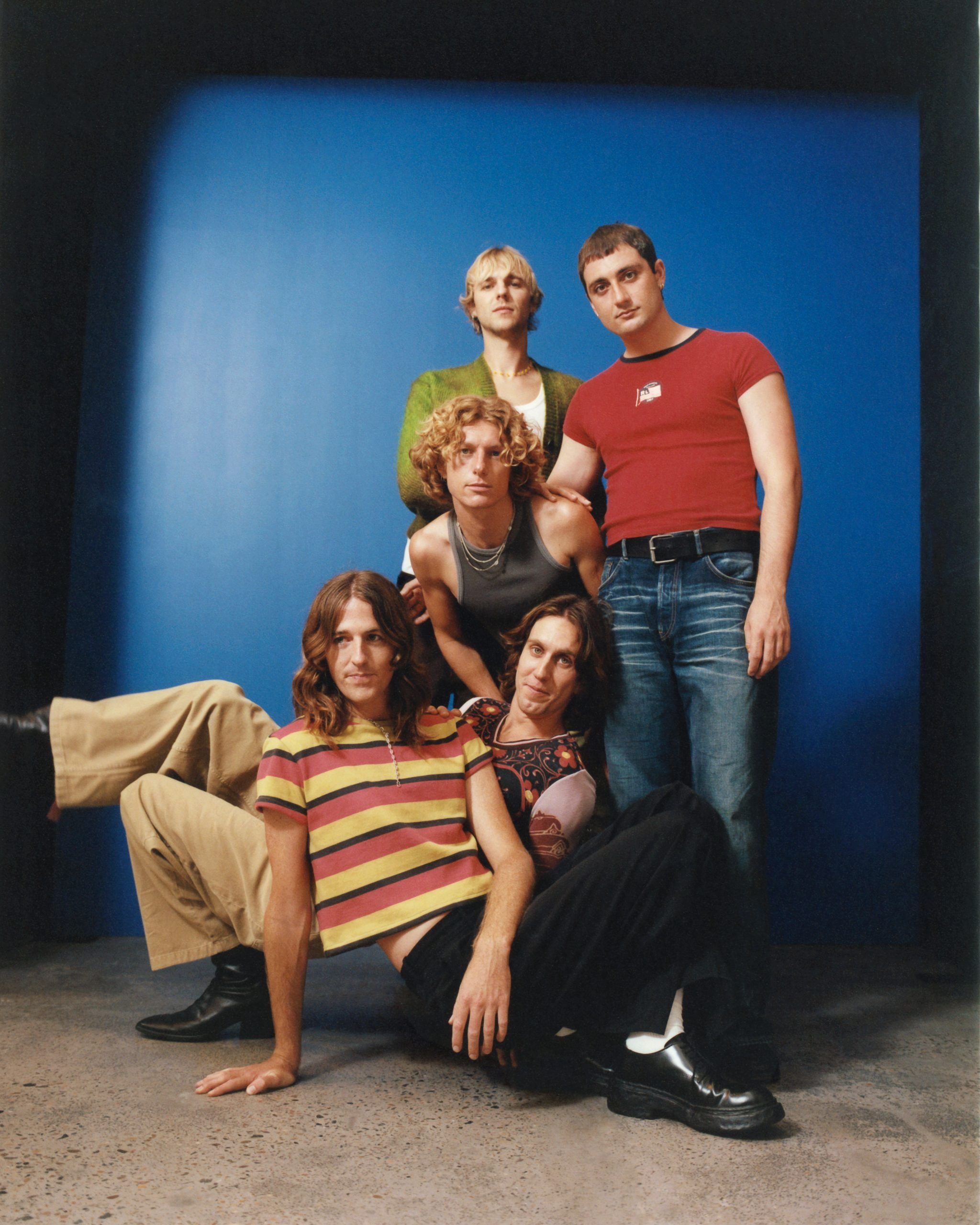
Patrick, congratulations on the release of LOVED! How does this project reflect both Parcels’ growth as a band and your own journey as an artist?
That’s a big question. It definitely has elements of our overall progression as a band over the years. It feels like a big mix of everything we’ve been working on, and maybe in our simplest form, this record, with us playing live together, singing together, and taking a really pure kind of version of Parcels.
Your music radiates so much happiness and optimism. Who do you turn to as a listener when you want to feel that same joy your fans get from Parcels?
Oh, good question. If we’re talking about euphoric music, I put on Earth, Wind and Fire. I feel that’s a big one. A lot of solo music, Al Green, Curtis Mayfield. Pop music: Chappell Roan. I mean, there’s a million different there’s a million different people.
I have to ask — do you still have that old computer with the broken keyboard, the one that led to Parcels’ one-word song titles? At what point did that shift from an accident into a conscious creative choice?
Yeah, well, I don’t have it anymore. I’ve upgraded my laptop since then, which is good. But it was pretty quickly a conscious choice. It was immediate, it came from a few mistakes, and then it became just a little kind of ritual, a little like a joke sometimes, but it was immediate. I think some of our first songs were already playing with the word play of it as well. So it felt kind of fun from the start.
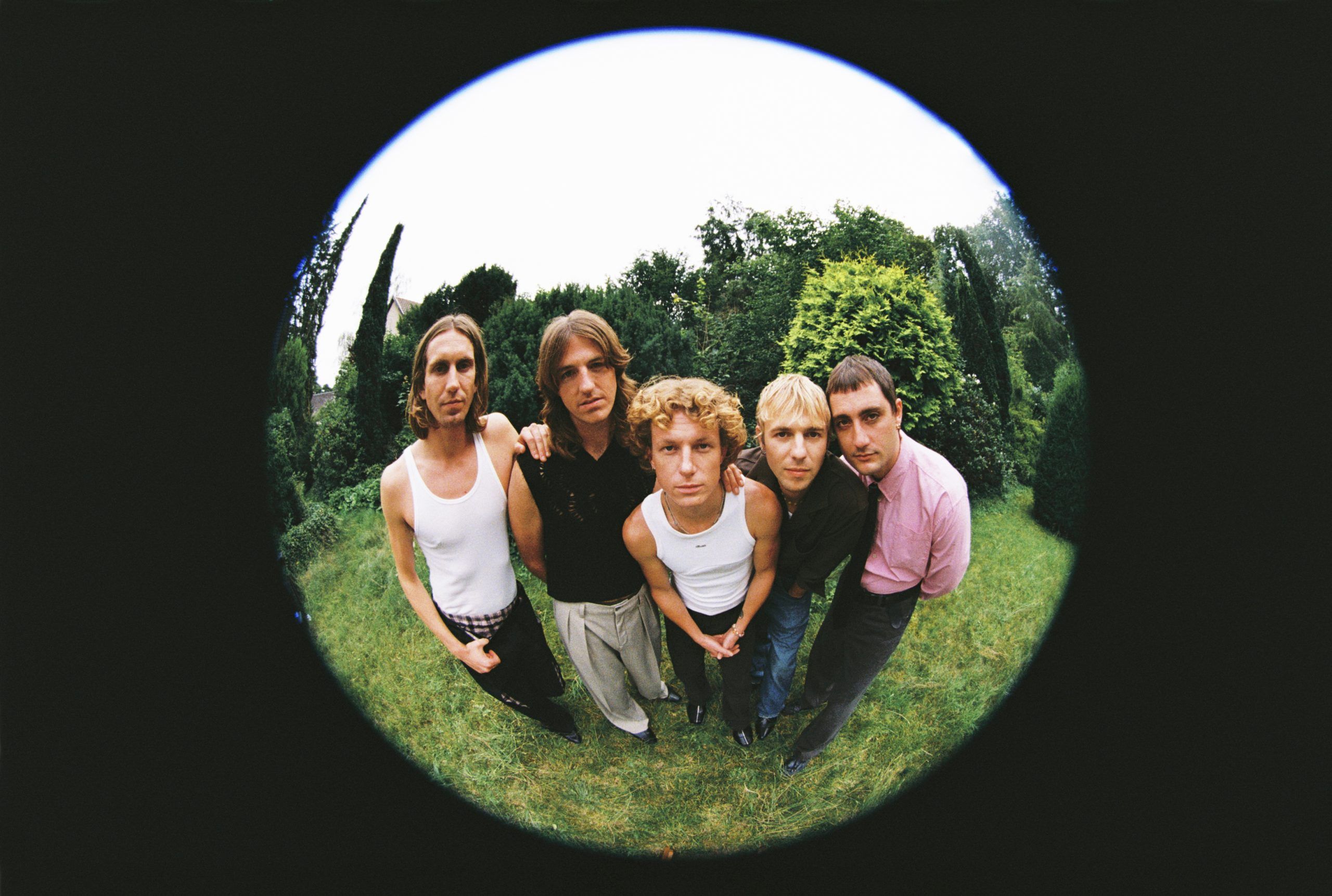
The harmonies on LOVED are phenomenal, especially on “Sorry”. What was the process of layering those vocals like, especially as you recorded across Berlin, Byron Bay, Sydney, Oaxaca, and Mexico City?
The vocal process, I think we realised at some point, well definitely for me, I realised, this album is really about the vocals, and that’s got to be at the front, and that’s like the focus of the whole thing. So that was a really fun process, and there were a lot of different layers to it, a lot of different phases to that process. The lead vocal was, like you say, recorded in a lot of different studios all over the place. Sometimes it’s a demo that I would record in Berlin, or Noah would record in Byron in Australia and we would use them throughout the process and record the instrumental over that even sometimes.
Or sometimes, we would put it on the end, and then there’s multiple layers of these group vocals and harmonies, usually two layers of us singing live, the four of us around two microphones in stereo to create a wide room space. So hopefully it feels like you’re standing right in the middle of us, but then that’s quite a spacious sonic, so we also layered quite a lot of close vocals, a lot of ad-libs, a lot of kind of fun closer vocals, very quietly underneath. Especially for “Sorry”. There were so many tracks there. Dealing with those sessions and the editing was a big job, too.
You’ve sat with LOVED for quite some time before putting out the record, which is often how it works for any band or artist. So now to put the third studio album out… when you get to an album release point after working on something in the background for a long time. To get to that point, how do you normally feel? What goes through your mind?
It’s a strange process and even now talking about Loved, it’s pretty hard to to know what this moment is for us, and what, what the album is for until something’s out in the world for a while, and you can kind of reflect back on it. I can’t really like, put it in a specific place.
Usually, I’ve worked so much on this recording and production that it doesn’t really mean anything musically. The sounds have come into my ears so many times that it’s just a big sort of jumble, and I have no objectivity anymore by the time we get to the end. I’m also just a little bit sick of the songs [laughs]. But yeah, it’s a strange thing. Now, having done this a couple of times, I know that it’s not the moment I feel good when we put it out. As soon as we finish it, I have to completely let go of it. The fun for me is in the making of it, and then I can think about the next one. And then with time, looking back, I can appreciate the ones that we’ve done.
Can you take me back to that moment in Paris in 2016 when you realised Daft Punk were at your first show in the city? And what was it like being invited into the studio with them afterwards?
It was so exciting, I guess, pretty surreal. It was pretty strange knowing that they’re at the show, and then being invited to the studio, that all didn’t feel very real. Then suddenly we’re just in the studio, working away at a song and coming home every night It was our first time in a studio recording as a live band.
We’d always done sort of bedroom stuff or stuff in the shed in Australia, and it was really thrown into the deep end of something [laughs]. But it was so exciting, like such a rush.
As a keyboardist, guitarist and vocalist, how do you feel your own playing shaped the textures and direction of this new record?
Playing like instrumental-wise?
Yeah!
That’s a good question. I don’t really think about it so much because I’m very focused on more the production and the overall sound. I think that probably goes for all of us. Certainly for myself, I’m thinking about the whole piece and how it sounds coming through the speakers and in my headphones as we’re playing. So the instrumental thing is really just, usually just what’s the least I can do here to add something to the feeling of the song.
On this record, there was a lot of live playing as well. Every take we would record would be a totally different feeling, and there was a lot of improvising and just little nuances to every take. I guess with my playing, I was trying to add spontaneity and a kind of ambience to things sometimes on this record, with the piano and the keyboard, especially. Trying to create a feeling of randomness. I’m really into that, something spontaneous.
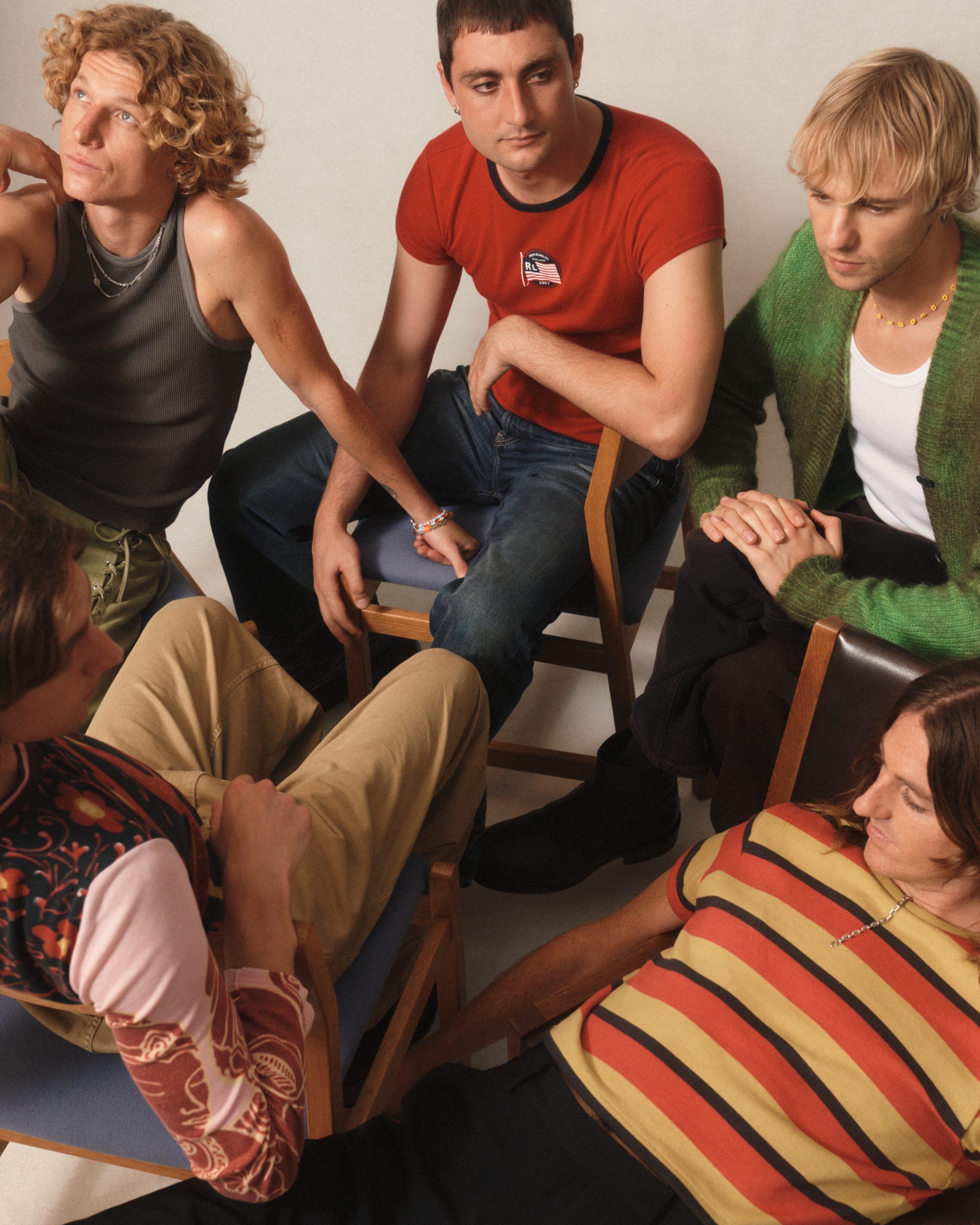
Wembley Arena is such a milestone for any band. How are you planning to expand the Parcels live show for a stage of that size?
Yeah, it’s so exciting. There’s the production side, which is really fun to be able to work with the bigger stage, lighting team, video production and and kind of come up with ideas of little twists and turns that we can put the set through. Then also, same thing musically, we love the kind of theatre of a long journey set with a lot of different transitions to different moods. I think the exciting thing about a bigger venue is how can we really magnify the sonic highs and lows of the set and really make it feel more dramatic. So that’s what we’ll aim to do.
What’s it like on stage for you? I’ve spoken to some artists in the past who have said they’ve just blacked out on stage for big shows due to adrenaline. Are you just super focused, nervous? Tell me about it.
It’s very intense. There are a few different scenarios. My favourite is when I’m very comfortable and relaxed, and I feel calm. But that doesn’t usually happen when a show is big or especially big, and I’m not used to it. Then it’s the full adrenaline rush. It is like a drug. It’s a very heightened, kind of intense feeling, and with the five of us, we’re all kind of looking at each other just trying to keep our feet on the ground in a way.
I wouldn’t say I black out, but I definitely go into another state, and can come off pretty exhausted and confused afterwards. It’s definitely hard to describe. But yeah, sometimes when it gets too big, there’s a thin line between it becoming a little bit too big or just something I’m not used to, which makes me quite nervous and uncomfortable for the first few songs, at least.
Looking back over the past 11 years, are there any particular moments that feel especially defining for you personally? It might even be something small. It could be something like: ‘this was the time when we, when our self-produced EP got heard by this person’, whatever comes to mind.
In that regard, there are little moments in our early days when we started the band and moved to Berlin. Just busking on the street and the first concert that we ever put on in a small cafe to ten people standing there. The person who would later become our booking agent and manager was in that group of people, and was so supportive and loving it. A few moments in those early days, one time, somebody organised an industry event, and we were supposed to play it, and it was right after we played our first little gig in the bar, the event was the next day.
But we got so excited after the first gig in the bar that we just partied all night and totally slept through the industry concert [laughs]. Our manager at the time was so mad at us, understandably. We were just fresh out of high school and unaware of business, plans, and we just didn’t have anything together. It’s just funny to think back on that and remember these little moments; people explaining to us this is how it all works, there are people relying on you now, and you have to be responsible for something sometimes.
Finally, if you could manifest anything for yourself right now for your personal life or career, what would it be, and why?
Wow, big. I’m trying to make a life where I can just make more stuff, be creative as much as possible, and put it out into the world. The more and more time i spent in that state of creating stuff because it feels good, it’s exploring, and it’s fun. That’s what I’m trying to manifest, or just slowly move towards because it’s tough to kind of do that with this industry. There’s a lot of other stuff around that, the touring.
So that’s all I really want, in general, is to make stuff.
Thanks for your time, Patrick! I appreciate spending the time to chat.
Thanks for the questions that made me think [laughs]. Thanks, mate.
Parcels’ third studio record LOVED is out now.
Interview Cameron Poole
Featured image Drew Wheeler

